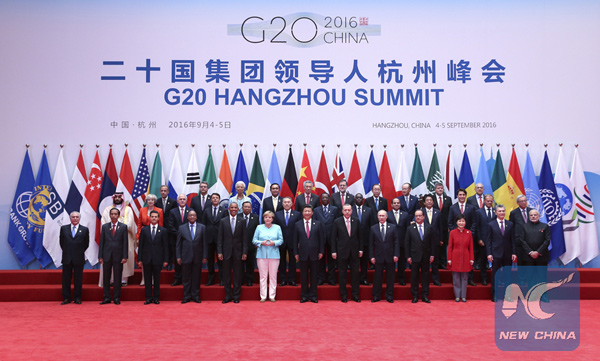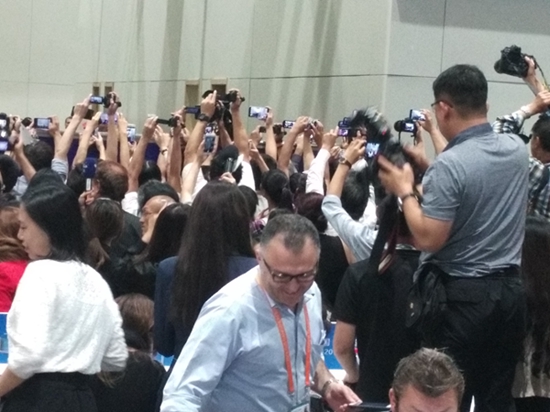

Last week Monday, the Hangzhou G20 Summit ended in celebration note and was recorded as the best hosting in the eleven seasons of the event.
But beyond the member states that include the 19 biggest economies of the world as sovereign states and the largest world economic bloc, the European Union, whom the union is supposed primarily to benefit, the hosting by China changed the configuration of the summit deliberations.
That was actually in fulfillment of the promise of China to do so.

Also, judging from the presence of Africa in the summit at the behest of China that invited two presidents and the chairman of the African Union, and also the coverage of the event by 28 African journalists from 27 countries, the largest in the history of the G20, also, it would be properly tagged that Hangzhou G20 was a summit for African interest.
With the presidents and the bevy of journalists from the continent, the China hosting of G20 made it a household event in Africa especially at a time dire economic realities make the economy a most discussed issue in the world.
In addition, the summit captured the world media attention and hosted the largest team of journalists since G20 Summit started.
For instance, the three presidents from Africa came with their media teams. That was also the case with the three presidents from Asia, including the chairman of ASEAN, also the President of Laos and another guest state from South America. The Secretary General of the United Nations, Ban Ki-moon and president of the World Bank, Jim Yong Kim, and IMF managing director, Christine Lagarde also attended.
The spacious world class media centre that was equipped with modern facilities was always filled to capacity for four days. Outside the main hall of the media centre, the larger media bodies from US, Germany, UK, France etc, including of course radio, TV and newspapers from China and also the People’s Daily had elaborate private booths that were enough to serve as alternative media house to their head offices for the duration of the event.
The vast media centre was also a high point of the summit as about 2500 journalists from at least 65 countries fraternized and did their work of projecting the same summit to the world.
The Hangzhou summit with super organizational touch in security, catering, transportation, accommodation and facilities were most commendable. The security measures in today’s world of terror attack was sophisticated and flowed with precision and without inhibitions of overzealous operatives. The journalists’ work centre and hotels provided 24 hours transport and refreshment services for the days the summit lasted that made every accredited journalist work optimally.

Hangzhou G20 Summit media centre
Africa inclusive
But above all else, President Xi during his media briefing at the close of the summit assured that the G20 is today not just a body for the members but for the whole world economy, and being certain that the group of states that control the affairs of the whole world economy, it decided to handle the global economic issues as part of its agenda.
Prior to the Summit, China had assured that it would bring to the attention of the body issues relating to over 123 poorer countries and make G20 see the importance of focusing on their benefits for growth. At a briefing by the Foreign Minister Wang Yi in Beijing in May, China said until those poor nations are helped out of poverty, the world would have no peace and for the world to make progress means the poor countries must be considered.
Sequel to that resolve, the summit agreed that: “We will work to ensure that our economic growth serves the needs of everyone and benefits all countries and all people including in particular women, youth and disadvantaged groups, generating more quality jobs, addressing inequalities and eradicating poverty so that no one is left behind.”
President Xi stated that the G20 concluded that the poorer countries are priority of the economic growth, and also that the growth and industrialization of African countries which China pursues through the awesome FOCAC has become a concern and business of the G20.
Article 13 of the decisions of the Hangzhou G20 read out by Xi noted that: “To seize the opportunity that the new industrial revolution (NIR) presents for industry, particularly manufacturing and related services, we deliver the G20 New Industrial Revolution Action Plan. We commit to strengthen communication, cooperation and relevant research on the NIR, facilitate small and medium-sized enterprises (SMEs) to leverage benefits from the NIR, address employment and workforce skill challenges, encourage more cooperation on standards, adequate and effective IPR protection in line with existing multilateral treaties to which they are parties, new industrial infrastructure, and support industrialization, as committed in the action plan. We also support industrialization in developing countries, especially those in Africa and Least Developed Countries (LDCs). We are committed to supporting our workforces throughout this transition and to ensuring that the benefits of the NIR extend to all, including women, youth and disadvantaged groups. We call for cooperation to maximize the benefits and mitigate the negative impact of the expected technological and industrial changes. In all these initiatives, the G20 will take into consideration the different opportunities and challenges for developing and developed countries.”
That promise kept by President Xi at the world larger platform for the biggest economies was further demonstration of his earlier commitment to Africa industrialization for which he had pledged $60b in the Johannesburg FOCAC Summit in December 2015. This agenda has been pursued to a very large extent as explained in the July evaluation FOCAC forum in Beijing attended by 53 African state members where about $51b of the fund had already been signed off in about 250 MoUs between China and the African state members.
Another issue of great importance the G20 agreed on as read out by the Chinese president is the plan to pursue an international agenda to stop people indicted of corruption in their country from hiding themselves or their loot in any country. That if implemented would be of great benefit to Africa where many leaders loot the state and ferry the money to foreign countries and leave the continent less impoverished and also evade punishment. If such law comes into force, maybe through the UN at the instance of the G20, which some of the members are the custodians of such slush fund, then Africa would have had a better chance of economic recovery. If that is done, the credit would go mainly to China whose hosting of the Summit made such vital decision possible.
Emewu is senior editor of The Sun Newspaper, Nigeria, Fellow of the China Public Diplomacy, Beijing. He was until last month intern in People’s Daily (ikeroyalemewu@yahoo.com)
 Fire brigade in Shanghai holds group wedding
Fire brigade in Shanghai holds group wedding Tourists enjoy ice sculptures in Datan Town, north China
Tourists enjoy ice sculptures in Datan Town, north China Sunset scenery of Dayan Pagoda in Xi'an
Sunset scenery of Dayan Pagoda in Xi'an Tourists have fun at scenic spot in Nanlong Town, NW China
Tourists have fun at scenic spot in Nanlong Town, NW China Harbin attracts tourists by making best use of ice in winter
Harbin attracts tourists by making best use of ice in winter In pics: FIS Alpine Ski Women's World Cup Slalom
In pics: FIS Alpine Ski Women's World Cup Slalom Black-necked cranes rest at reservoir in Lhunzhub County, Lhasa
Black-necked cranes rest at reservoir in Lhunzhub County, Lhasa China's FAST telescope will be available to foreign scientists in April
China's FAST telescope will be available to foreign scientists in April "She power" plays indispensable role in poverty alleviation
"She power" plays indispensable role in poverty alleviation Top 10 world news events of People's Daily in 2020
Top 10 world news events of People's Daily in 2020 Top 10 China news events of People's Daily in 2020
Top 10 China news events of People's Daily in 2020 Top 10 media buzzwords of 2020
Top 10 media buzzwords of 2020 Year-ender:10 major tourism stories of 2020
Year-ender:10 major tourism stories of 2020 No interference in Venezuelan issues
No interference in Venezuelan issues
 Biz prepares for trade spat
Biz prepares for trade spat
 Broadcasting Continent
Broadcasting Continent Australia wins Chinese CEOs as US loses
Australia wins Chinese CEOs as US loses